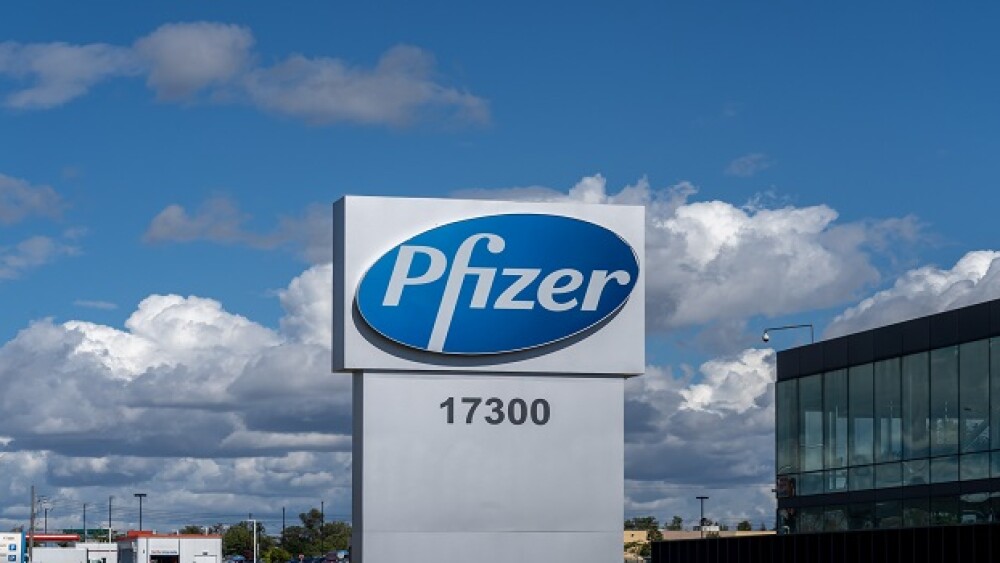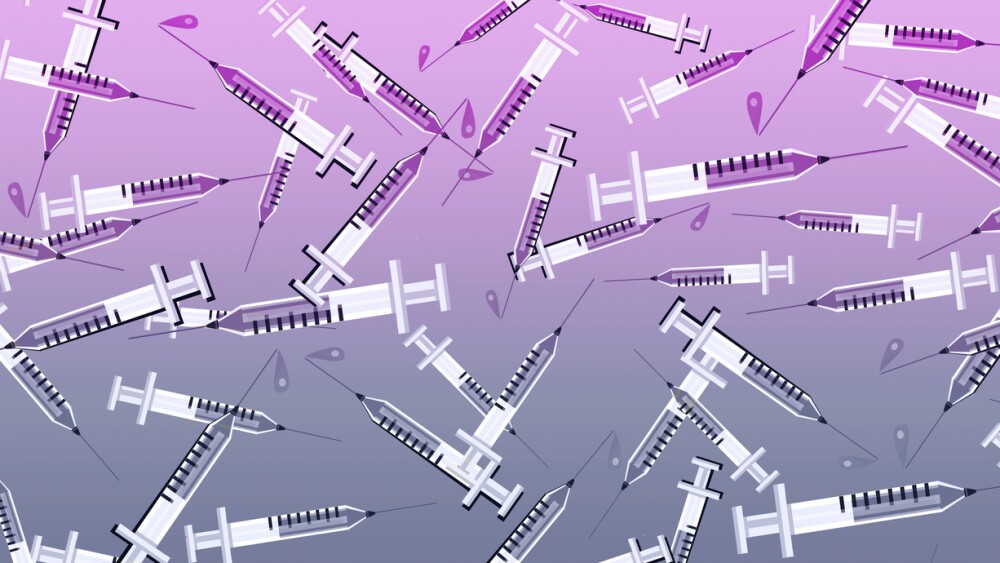Pfizer reported first-quarter revenues of $25.7 billion, a whopping 82% operational growth. This growth was largely driven by its COVID-19 vaccine developed with BioNTech and its antiviral drug, Paxlovid.
Courtesy of JHVEPhoto/GettyImages
Pfizer reported first-quarter revenues of $25.7 billion, a whopping 82% operational growth. This growth was largely driven by its COVID-19 vaccine developed with BioNTech and its antiviral drug, Paxlovid.
The COVID-19 vaccine is the most used in the U.S. and Europe. In the U.S., it is authorized for everyone aged five years and older. The company is submitting data to the U.S. Food and Drug Administration for its three-dose regimen for children under five years of age, which is the only age group left in the U.S. that isn’t eligible for the vaccine.
In a recent interview, Albert Bourla, company chair and CEO, indicated he hoped the vaccine would be authorized for that age group in June. On the company’s conference call, Bourla indicated plans to submit for EUA in the next few weeks.
Bourla also stated that Pfizer is continuing to develop next-generation vaccines in hopes of having them authorized in the fall.
In a statement, Bourla said, “We continue to supply the world with Comirnaty, which remains a critical tool for helping patients and societies avoid the worst impacts of the COVID-19 pandemic, and we are on track to fulfill our commitment to deliver at least 2 billion doses to low- and middle-income countries in 2021 and 2022, including at least 1 billion doses this year. In addition, we are delivering on our production commitments for Paxlovid, which is already having a profound impact on the lives of patients.”
The company reaffirmed its guidance for the year, projecting revenues of $98 to $102 billion. Comirnaty, the Pfizer-BioNTech COVID-19 vaccine, is projected to bring in $32 billion for the year, and Paxlovid is estimated to raise $22 billion.
However, Pfizer’s guidance for its adjusted diluted Earnings Per Share (EPS) has been revised downward of $6.25 from $6.45, reflecting an $0.11 negative impact based on an accounting policy change, as well as research-and-development costs and changes in foreign exchange rates.
Breaking the company’s financials down by segment, vaccines brought in $14.941 billion, hospitals brought in $3.191 billion, Oncology reported $2.967 billion, Internal Medicine noted $2.440 billion, Rare Disease reported $963 million and Inflammation & Immunology reported $821 million. Hospital revenues were also up 69% from the first quarter in 2021, Oncology was up 4%, and Rare Disease was up 17%. However, Internal Medicine was down 6%, and Inflammation & Immunology dropped 23%.
The most notable decreases were Chantix, which was down globally 99% operationally, negatively impacted by a global pause in shipments of the drug to the presence of above an acceptable intake level in various countries. Xeljanz was down 29% globally, driven by ongoing shifts in prescribing patterns associated with JAK class label changes, and Ibrance was down 5% in the U.S. due to an increase in the percentage of patients accessing it via the company’s Patient Assistance Program.
Frank D’Amelio, chief financial officer and executive vice president, said, “We also entered the open market to repurchase shares of our stock for the first time since 2019. We will continue to thoughtfully deploy our capital in a variety of shareholder-friendly ways with the goal of maximizing the value we provide to all of our stakeholders, including patients and shareholders.”
Bourla also made a pitch for Pfizer as an attractive biotech partner and as an employer, noting that globally, its female colleagues were paid greater than 99% of what their male colleagues were paid and that in the U.S., minorities were paid 100% of what non-minorities are paid.
In terms of the Russia and Ukraine war, Pfizer is donating all profits of its Russian subsidiary to organizations that provide direct humanitarian support to Ukrainians, will no longer initiate new clinical trials in Russia, will halt recruitment of new patients in ongoing trials in the country and will halt all future investments with local suppliers intended to build manufacturing capacity in Russia.
Bourla also indicated the company has pledged not to profit from sales of its COVID-19 treatment to the world’s poorest countries. And the company has made a deal with UNICEF to supply up to 4 million treatment courses of Paxlovid to 95 low- and lower-middle-income countries at a not-for-profit price.
Dr. Mikael Dolsten, M.D., Ph.D., Pfizer’s chief scientific officer and president, Worldwide Research, Development and Medical, said, “We continue to pursue a comprehensive clinical strategy for Comirnaty, evaluating real-world vaccine effectiveness, demonstrating higher immunogenicity with a booster, expanding vaccine to pediatric populations, and addressing emerging variants of concern.”
Featured Jobs on BioSpace





